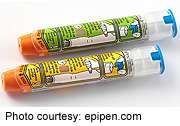(HealthDay)—A structured education intervention improves knowledge and emergency management for patients at risk for anaphylaxis and their caregivers, according to a study published online Nov. 19 in Allergy.
Knut Brockow, M.D., from Technische Universität München in Germany, and colleagues conducted a multicenter randomized trial involving 95 caregivers of affected children and 98 patients with previous episodes of anaphylaxis. Participants were randomized to an intervention group, which received two three-hour schooling modules of group education, and a control group that received standard autoinjector training only. The main outcome measures were knowledge of anaphylaxis and emergency management competence in a validated training anaphylaxis situation.
The researchers observed a significant improvement of knowledge from baseline to three months with the intervention versus control (P < 0.001 for both caregivers and patients). Compared with controls, there was an increase in emergency management competence after intervention (P < 0.001 for caregivers and patients). There was a significant reduction in caregiver anxiety with the intervention (P < 0.05). No significant changes were observed in depression scores.
"Structured patient education programs may be beneficial in the management of anaphylaxis by increasing patients' empowerment to prevent and treat the disease," the authors write.
More information:
Abstract
Full Text (subscription or payment may be required)
Journal information: Allergy
Copyright © 2014 HealthDay. All rights reserved.






















